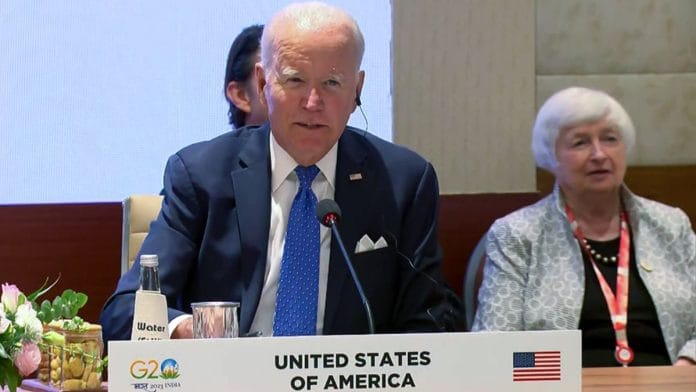New Delhi: US President Joe Biden’s announcement Sunday night makes him the first presidential candidate in American history to withdraw from the race on such short notice. Even President Lyndon B. Johnson, under pressure during the Vietnam War, bowed out in March 1968 before the November elections, not in July.
This unprecedented, last-minute development has divided experts on whether Donald Trump, the Republican presidential candidate, will benefit, as well as what this means for India.
External affairs minister S. Jaishankar has repeatedly said that India’s partnership with the US will continue to grow irrespective of whether a Republican or a Democrat is elected to the White House. Though there is bipartisan support in the US for deepening ties with India against a rising China, challenges such as India’s closeness with Russia and the alleged murder-for-hire plot against Sikh separatist and American citizen Gurpatwant Singh Pannun remain.
Some experts say Trump will gain from Biden’s withdrawal, especially after he survived an assassination attempt on 13 July. “This is advantageous to Trump. Biden was flailing and had to step down, but still had some pan-American support even in the Upper Midwest states. Can the same be said about Kamala Harris?” Harsh V. Pant, vice president of the Observer Research Foundation (ORF), a New Delhi-based think tank, told ThePrint.
National polls show that Trump is ahead of Vice President Kamala Harris — now endorsed by Biden — by two percentage points. Harris herself is yet to be confirmed as the Democratic Party’s presidential candidate. All will be revealed at the Democratic National Convention on 19 August.
Yet, other experts say Biden’s decision to step down is good news for the Democratic Party’s long-term strategy. “Democrats were concerned that, if Biden were to continue, they might lose not only the presidency, but also elections to the House of Representatives and the Senate, thereby leaving no checks and balances on Trump,” Meera Shankar, a former ambassador to the US, told ThePrint.
Elections will be held for the presidency, the US House of Representatives, and one-third of the Senate on 5 November.
Harris, if confirmed, has less time to campaign, mobilise support and enthuse the electoral base. “The polls have been in favour of Trump ever since Biden began losing ground following the CNN presidential debate. However, it is currently difficult to predict who gains an advantage by Biden stepping down,” Shankar added.
Since Biden’s poor performance in the debate three weeks ago, Trump has been gaining a national lead over the sitting president in polls. Even before the Trump shooting, the nonpartisan newsletter Cook Political Report moved three key swing states — Arizona, Georgia and Nevada — from undecided to “Lean Republican”.
The battleground states expected to decide the outcome of the election are Pennsylvania, Arizona, Georgia, Wisconsin, Michigan, Nevada and North Carolina.
What this means for India
As New Delhi watches the developments in America with a keen eye, there seems to be an understanding that India will be able to handle relations with whoever assumes charge of the White House, according to people familiar with the matter.
Last Friday, former foreign secretary Vinay Mohan Kwatra was officially appointed India’s next ambassador to the US. Kwatra will face challenges spurred by concerns in Washington DC over Modi’s recent visit to Russia, as well as the alleged Pannun murder plot.
Last week, India’s Ministry of External Affairs said the country “values strategic autonomy” in response to stern remarks issued by the US Ambassador to India Eric Garcetti a week prior.
“India, like many other countries, values its strategic autonomy. The US ambassador is entitled to his opinion. We also have our own and different views,” the MEA spokesperson told reporters Friday.
Following Modi’s visit to Moscow, Garcetti had said on 11 July: “I respect that India likes its strategic autonomy. But in times of conflict, there is no such thing as strategic autonomy.” The “conflict” was believed to be a reference to the Ukraine war.
Rajesh Rajagopalan, professor of international politics at Jawaharlal Nehru University (JNU), told ThePrint, “Democrats have a better chance of coming back to power, now that Biden has stepped down. Trump was only a couple of points above Biden after the assassination attempt, indicating a significant level of an anti-Trump vote. This would mean a more stable US foreign policy rather than the Trump chaos.”
On the Pannun issue, there would be little to no difference between a Democrat or Republican president, given it involves American territorial sovereignty, said Rajagopalan. “But on domestic Indian issues like secularism and human rights, a Democrat will be harder on India,” he added.
(Edited by Radifah Kabir)
Also read: ‘Biden’s xenophobia comment regrettable,’ says Japan’s Chief Cabinet Secretary Yoshimasa Hayashi






